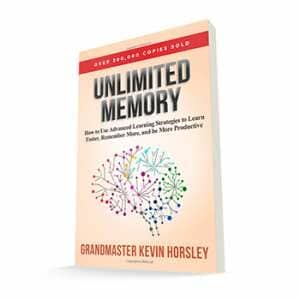 Unlimited Memory by Kevin Horsley is a very popular memory improvement book.
Unlimited Memory by Kevin Horsley is a very popular memory improvement book.
The question is…
Does it live up to its claims?
Yes and no.
But mostly yes, even if the title doesn’t really make sense.
What I have to say about it might seem like quibbling, but there’s an important lesson in why I’m taking the time to analyze it to this extent.
And I hope you’ll find everything I have to share in this Unlimited Memory review more than useful.
I hope it will help propel your memory skills to entirely new levels you might not have known were possible.
Ready?
Let’s dive in!
Unlimited Memory Review: What You Need to Know
Unlike Harry Lorayne’s Ageless Memory, Unlimited Memory is directed at a much wider audience. Whereas Lorayne was addressing an aging population, Kevin Horsely seems to be focused on students who want to use memory techniques to study faster.
Like The Victorious Mind, it combines memory techniques with tips and tricks related to mental strength.
These features are great because as Horsley explains:
“Improving your memory and concentration is not only about what you need to do more of; it is also about what you need to do less of.”
This provides you with an additional feature lacking from similar programs like Mega Memory.
So if your mind is filled with excuses that prevent you from taking action, Unlimited Memory is definitely for you.
But if you’re already a person who takes action, you might find Horsley’s book a bit heavy on the cheerleading and self help side of things.
Who Is Grandmaster Kevin Horsley?
Like many memory experts who go on to achieve great feats of recall, Kevin Horsley started with a learning disability.
Nonetheless, the South African memory expert went on to win the world record for memorizing 10,000 digits of pi.
That’s a lot of numbers!
But as Kevin has discussed, anyone can do it, even if it’s a more modest number like 1200 digits.
He’s also pointed out that he’s met many people who have mastered multiple memory techniques.
Sorry to burst your bubble, but Kevin says that each and every one of them were absolutely normal.
I’ve talked to many of the same people and I totally agree.
Except in one regard:
Putting in the practice is somewhat unusual, and all the more so in today’s world of digital amnesia.
But that doesn’t have to be you. And Kevin’s Unlimited Memory is an excellent resource that will educate and inspire you to take action. And that’s because he’s a legitimate expert and top performer in this field.
With all of that in mind, let’s talk about why this book will be helpful to you.
The Core Memory Techniques Horsley Covers
When it comes to the memory techniques themselves, the material is great and draws upon Tony Buzan, Harry Lorayne and some of the ancient memory techniques many readers of this blog have come to know well from multiple sources.
The core techniques come down to what Horsley calls the SEE principle:
- Senses
- Exaggeration
- Energize
These are the basics of using mnemonic imagery.
If you’re new to memory techniques, you’ll find a very good rundown of what they are and how they work.
If you’re already well-versed in the core strategies, you’ll find an excellent review and you may think of them in new ways.
Horsley also gives neat variations on the Memory Palace technique, such as using your car as a source of loci.
A Primer On Habits
One of the greatest parts of Unlimited Memory are not just the habits you can use to fit memory techniques into your life. Horsley gives you an example of a Memory Palace that will help you remember these key habits.
This feature of the book is great because just about everyone has more than enough information about memory techniques. But so many people are overwhelmed by them.
Horsley is good on this point too.
Countering Objections
I feel that I can tell from the many objections Horsley addresses in Unlimited Memory that he is a legitimate coach. I feel this way because I’ve heard many of the same objections throughout my career.
For example, he points out how many people complain that the Memory Palace technique just gives people more to remember. He addresses this objection well.
He also talks about the power of “superior organization.” And putting in the effort needed to achieve this is proven beneficial many times by explaining the pitfalls of relying on rote learning.
Problems With Unlimited Memory
As I mentioned, I think the title is a bit of a problem.
Why?
Because the truth is that your memory is not unlimited. And memory techniques work precisely when we accept and voluntarily place limits on what memory can be.
Of course, other memory improvement products have similar issues in their marketing. And people often go out of their way to misinterpret what gets said about “gurus” like Vivekananda – such as the claim he could recite text verbatim after looking at a book once.
But Tony Buzan, whom Horsley quotes frequently, taught us that “the rules will set you free.”
And he meant that because memory techniques very specifically ask us to limit our focus to small sets of tools like pegwords and number rhymes.
Don’t get me wrong! Horsley covers these techniques incredibly well. But it would be helpful to move past the marketing talk of “unlimited” memory and speak more directly to the core of why and how memory techniques work.
Your progress is based on accepting and exploiting limits, not fantasizing that anything about your brain, your time or your energy are unlimited. They are not.
Should You Read Unlimited Memory?
The answer is absolutely yes!
Despite my misgivings about the title and its implications, it’s a great book, especially for beginners.
But even more advanced users of memory techniques will learn new things too. If you don’t, you’re probably not paying attention.
Besides, it behooves all of us who care about education to support memory educators. Read their works, put their techniques and tools into action, and share them widely.
And if you find that level of engagement difficult, that’s all the more reason why you need to read this book. Its chapter on self-discipline is worth the price of admission overall.
I especially love this aspect of the book because Horsley isn’t afraid to call a spade a spade.
As he points out:
“When you are following a discipline [emotions] only get in the way. If you have to floss your teeth, you don’t have to consult your intuition, you just do it. When you have to exercise you don’t have to listen to your feelings, just do it.”
This wisdom has become more important than ever before as people fall prey to the idea that their emotions should rule their lives.
That’s simply not how top performers operate.
And I teach from this basis myself, so if you liked this review, please consider grabbing my FREE Memory Improvement Kit:
Like Horsley, I take you through multiple approaches to the core memory techniques.
You’ll also get no shortage of “tough love” and tips that help you take action, even when you don’t feel like it.
And as you’ve seen, I fully encourage you to read this book and many other Memory Palace training volumes.
Horsley clearly believes in promoting other books too. The bibliography at the end of Unlimited Memory shares some real gems.
Remember: One is the most dangerous number when you want to learn new things. Read as much as you can.
And as Horsley puts it, never forget that the batteries are never included in memory training books. You’ve got to bring those on your own.
But Horsley’s tips on getting habits for better memory into action are in a class of their own, so make sure to read this book.
Soon!
Related Posts
- How Jessie Villalobos Got A Promotion - Magnetic Memory Method Review
Looking for an extensive Magnetic Memory Method review? Listen to Jesse Villalobos show you how…
- Memory Athlete Braden Adams On The Benefits Of Memory Competition
Braden Adams is one of the most impressive memory athletes of recent times. Learn to…
- Want Unlimited Memory? Get This Book!
This book by a Grandmaster of Memory will take your memory skills to the next…







